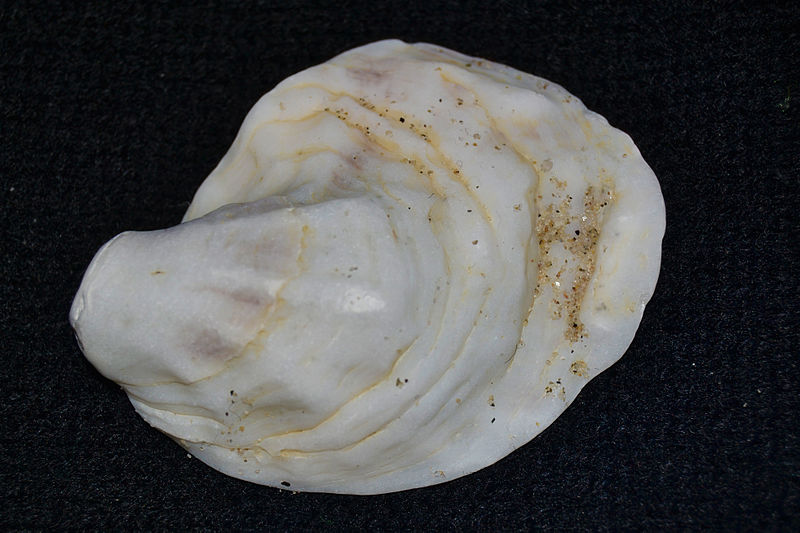Taxonomy
Kingdom: Animalia
Phylum: Mollusca
Class: Bivalvia
Subclass: Pteriomorphia
Order: Ostreida
Superfamily: Ostreoidea
Family: Ostreidae
Subfamily: Crassostreinae
Genus: Crassostrea
Similar species: Ostrea edulis
Previously known as: Ostrea virginica Gmelin

Biological Information/Life History
| Spat Growth Rate | 25 mm per year (NOAA) |
| Size at maturity | 20 cm (NOAA) |
| Life span | < 20 years (NOAA) |
| Mating/spawning season | Early summer (NOAA) |
| Sessile vs non sessile | Sessile |
| Reproduction | Spawning |
| Age for reproduction | > 1.5 years |
| Number of offspring | > 100 million |
| Role in food chain | Filter feeder (Newell et al. 1983) |
| Dispersal distance | N/A |
Common diseases: Dermo, MSX (NOAA)
Environmental Tolerances
| Temperature Range | 2-36°C (Sarinsky et al. 2005) |
| Salinity | 10-30ppt (Sarinsky et al. 2005) |
| Depth found at | 0.6-8.0 m |
Human Uses
Popular in aquaculture. Often commercially harvested for food.
Fun Fact
Eastern oysters begin their life as male then mature to become females.

References
Abeels, H. A., Loh, A. N., & Volety, A. K. (2012). Trophic transfer and habitat use of oyster Crassostrea virginica reefs in southwest Florida , identified by stable isotope analysis. Marine Ecology Progress Series, 462, 125–142. https://doi.org/10.3354/meps09824
Claire Antonucci, R. H., & Yuhas, and C. (1880). Eastern Oyster. Retrieved from http://njseagrant.org/wp-content/uploads/2014/03/eastern-oyster.pdf
Haven, S., & Morales-Alamo, R. (1970). Filtration of particles from suspension by the American Oyster Crassostrea virginica. The Biological Bulletin, 139, 248–264. Retrieved from https://www.journals.uchicago.edu/doi/abs/10.2307/1540081
Hayes, P., & Menzel, R. W. (1981). The reproductive cycle of early setting crassostrea virginica (gmelin) in the northern gulf of mexico, and its implications for population recruitment. (January 1980), 80–88. Retrieved from https://www.journals.uchicago.edu/doi/abs/10.2307/1540902
Kingsley-smith, A. P. R., Harwell, H. D., Kellogg, M. L., Allen, S. M., Allen, S. K., Kingsley-smith, P. R., … Luckenbach, M. W. (2009). Survival and Growth of Triploid Crassostrea virginica ( Gmelin , 1791 ) and C . ariakensis ( Fujita , 1913 ) in Bottom Environments of Chesapeake Bay : Implications for an Introduction. Shellfish Research, 28, 169–184. Retrieved from https://www.researchgate.net/publication/250181368_Survival_and_Growth_of_Triploid_Crassostrea_virginica_Gmelin_1791_and_C_ariakensis_Fujita_1913_in_Bottom_Environments_of_Chesapeake_Bay_Implications_for_an_Introduction
Kingsley-smith, A. P. R., Joyce, R. E., Arnott, S. A., Roumillat, W. A., Mcdonough, C. J., Kingsley-smith, P. R., … Reichert, M. J. M. (2019). Habitat use of Intertidal Eastern Oyster ( Crassostrea virginica ) Reefs by Nekton in South Carolina Estuaries. 31(4), 1009–1021. https://doi.org/10.2983/035.031.0413
Nestlerode, J. A., Luckenbach, M. W., & O’beirn, F. X. (2007). Settlement and survival of the oyster crassostrea virginica on created oyster reef habitats in Chesapeake Bay. Restoration Ecology, 15(2), 273–283. https://doi.org/10.1111/j.1526-100X.2007.00210.x
Newel, R. I. E., & Jordan, S. J. (1983). Preferential ingestion of organic material by the American oyster Crassostrea virginica *. 13, 47–53. Retrieved from http://agris.fao.org/agris-search/search.do?recordID=US201302199982
NOAA. (2019). Oysters. 1–11. Retrieved from https://chesapeakebay.noaa.gov/fish-facts/oysters
Smith, K., (2015). Eastern Oyster Crassostrea virginica ( Gmelin , 1791 ). (McLean 1941), 1–12. Retrieved from http://www.dnr.sc.gov/swap/supplemental/marine/easternoyster2015.pdf
Sarinsky, G., Carroll, M. A., Nduka, E., & Catapane, E. J. (2005). Growth and survival of the American oyster Crassostrea virginica in Jamaica Bay, New York. In Vivo, 27(1), 15–26. Retrieved from http://www.ncbi.nlm.nih.gov/pubmed/26862590%0Ahttp://www.pubmedcentral.nih.gov/articlerender.fcgi?artid=PMC4744623
THIS FISH. (2019). Traceable Species Eastern Oyster. Retrieved from https://thisfish.info/fishery/species/Eastern-oyster/
